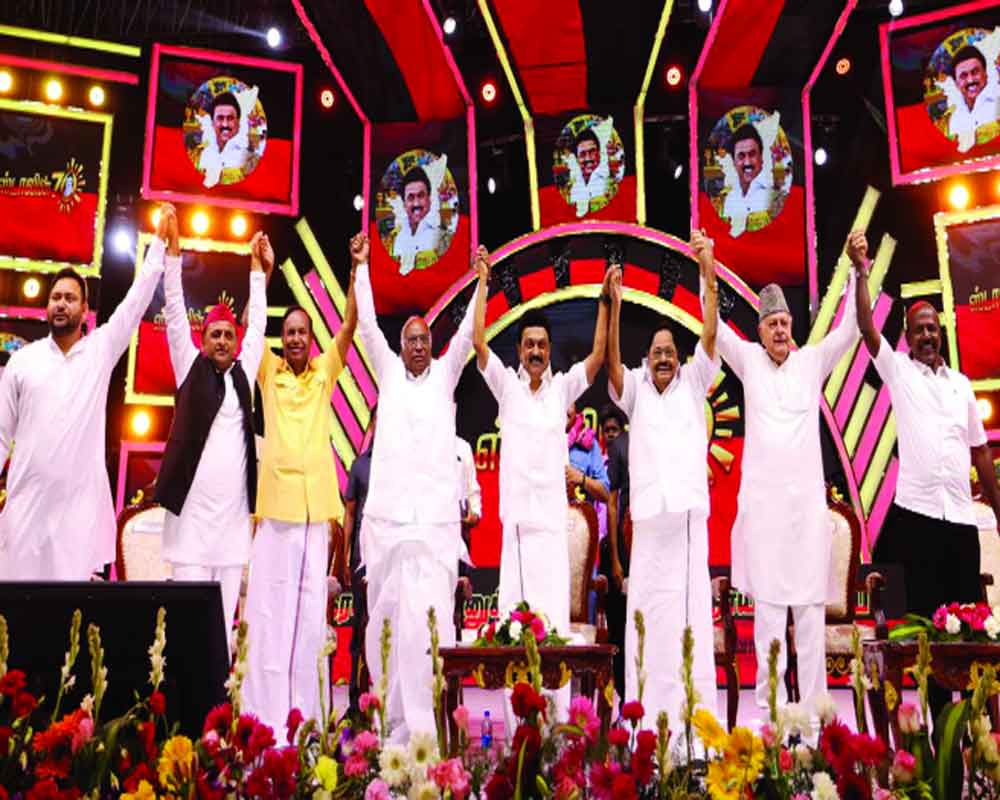Emulating successful coalitions like the Janata Party, United Front and National Front could prove advantageous for the opposition parties in the forthcoming elections
Congress Party's responsibilities have increased with the decision of the INDIA bloc to name Congress President Mallikharjun Kharge as the President. Bihar Chief Minister Nitish Kumar has declined the post of convenor. Forming partnerships before elections is relatively easy, but the real challenge lies in agreeing on seats. How difficult is seat-sharing for the INDIA Bloc, and can the Opposition overcome the obstacles before the polls?
The Congress party is leading a coalition of 26 partners to find a solution that satisfies everyone. They have decided to nominate a single candidate to contest against the Bharatiya Janata Party to prevent the opposition vote from being divided. However, the Congress-led coalition finds itself in a difficult position as most regional parties are bargaining hard for more seats, which could only come at the cost of the Congress party's interests. Mallikarjun Kharge has instructed the Party to initiate talks with other allied leaders to address this dilemma. It indicates that the Congress was prepared to contest in fewer seats, this time to accommodate the partners. The Congress party had formed alliances with other political parties in several states before the elections. It joined with DMK in Tamil Nadu, RJD. JD (U) in Bihar, and JMM. in Jharkhand.
Although these alliances continue, the Congress knows that seat-sharing will be challenging in certain states, particularly Delhi, Punjab, West Bengal, and Uttar Pradesh. The Congress party is currently trying to strike a balance between meeting the needs of their Party and their allies. It faces the challenge of maintaining positive relationships with its regional partners. The Congress's local units differ with the top leadership about giving away seats to partners. Seeing the reality, Kharge has directed the Party's alliance committee to put in extra efforts to accommodate allies. He has also reached out to opposition leaders to coordinate with the INDIA Bloc.
The Congress will fight against the BJP directly in 13 states and against non-BJP parties in Andhra Pradesh, Kerala, Odisha, and Telangana. The Congress will share space with the CPI (M) in West Bengal and Tripura. In the past, Congress wielded significant political power in Delhi and Punjab. However, the Aam Aadmi Party (AAP) has emerged as a strong contender against Congress' dominance, as it now holds power in both states. While the Congress aims for four seats in Delhi and seven in Punjab, the ruling AAP. The party seeks a larger share of seats.
Additionally, the AAP plans to contest in other states like Goa, Haryana, and Gujarat. Similarly, in UP, the Samajwadi Party; in Bihar, RJD. and JD (U); in Jammu and Kashmir, the National Conference and PDP; and in Tamil Nadu, DMK. are expected to have the upper hand. The Chief Minister of West Bengal, Mamata Banerjee, will be in control of her state. Meanwhile, in Jharkhand, the Congress, Jharkhand Mukti Morcha (JMM), and Rashtriya Janata Dal (RJD) are aiming to secure a larger share of seats than their partners in the INDIA Bloc. During the 2019 elections, Congress contested 421 seats but won only 52. They formed alliances in some states and contested in fewer seats, such as nine in Bihar, seven in Jharkhand, 21 in Karnataka, 25 in Maharashtra, and nine in Tamil Nadu. However, they contested in 70 out of 80 seats in Uttar Pradesh.
Congress has less chance of defeating the BJP on its own. It will not contest the 272 seats required to form the government independently but may contest 255 seats, the lowest ever. Its best-case scenario is to win 125 seats. As a key player, the Congress should focus on directly challenging the B.J.P. in over 190 seats, with strong leaders fielded from constituencies. The Party needs to strengthen the booth committees at the ground level.
The Bharat Jodo NYAY Yatra, led by Congress leader Rahul Gandhi, has also sparked controversy. KC Tyagi, leader of JD (U), questioned why Congress did not make it a joint yatra with opposition bloc partners. Although Congress invited its partners, how they will respond is still uncertain. A successful yatra will go to the credit of Rahul Gandhi. The Opposition is in a difficult situation regarding the inauguration of the Ram Temple. The opposition coalition has decided to boycott the event. Attending it would only support their narrative as it is a political spectacle for the BJP While Congress was internally divided, it declined the invitation. The CPI (M) leader, Sitaram Yechury, also politely declined the invitation.
Although the poll surveys have predicted that Prime Minister Modi will win the upcoming election, the Opposition still has a slim chance if they remain united. The opposition parties should take inspiration from successful coalitions like the Janata Party, United Front, and National Front. To win the election, the Opposition must communicate the Modi government's failures and their alternate plans more effectively. This will be challenging in the crucial Hindi belt. Ultimately, it is up to the voters to decide whether to continue supporting Modi.
(The writer is a popular columnist, views are personal)


























